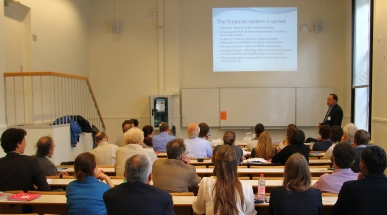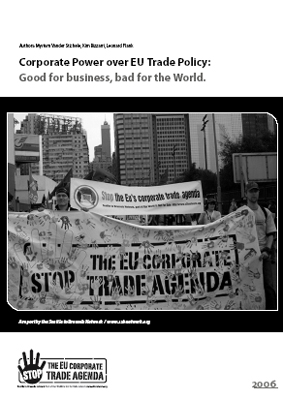
SOMO shifts Dutch banks towards more transparency on their lobbying activities
In reaction to SOMO’s new report ‘Taking lobbying public‘, Dutch banks have pledged to increase their transparency.
The report found that banks are still not making all the required information about their lobbying activities available – in spite of claims that they are reporting fully on these activities, in line with Global Reporting Initiative (GRI) guidelines.
Of the six Dutch banks included in the report, three of the banks – Rabobank, ABN AMRO and SNS REAAL – pledged that they will increase their transparency over the coming year. Rabobank and ABN AMRO will create a website with an overview of their current policy positions and submissions for consultations, as ING has done before following earlier SOMO research. Two of the banks – ASN Bank and Triodos – explicitly stated that they do not lobby individually on financial reform.
Accessibility of information
SOMO – the Centre for Research on Multinational Corporations – found that banks are currently not as transparent in their lobbying activities as they claim to be. SOMO’s researchers discovered that it is not possible to analyse the influence that banks’ lobbying efforts are having on public policies, based on the information that banks have made publicly available.
“Despite the enormous public outrage about the power of the financial lobby, the transparency of banks in this field is still minimal,” says SOMO Senior Researcher Rens van Tilburg. “However, we did find that banks are willing to improve their reporting, thereby allowing for a more open and balanced policymaking process.”
Recommendations
Of the ten steps towards transparency that SOMO recommends in the new report, the banks have agreed to implement around half. However, there are still some steps that the banks are not willing to take, including: the publishing of details of meetings with policy-makers; the publishing of written documents shared with regulators and policy-makers; and reporting on the job rotation between the public and private sector – the so-called ‘revolving door’. Most banks will also not publish work commissioned by their own organisation.
The current lack of transparency prevents an open and balanced debate about financial regulation from taking place, and increases the risk of regulatory capture – the process where policy-makers and supervisors defend the interest of the sector they are meant to regulate and supervise, even at the expense of the public interest. It thus affects the legitimacy of the policy- and decision-making process. In their new report, SOMO also includes recommendations for the Dutch government and the GRI.
Conflict of Interests
Anat Admati, Professor at Stanford University and author of the bestselling book The bankers’ new clothes supports SOMO’s recommendations:
“On issues related to risk in banking, there is a fundamental conflict of interests between banks and society. The potential harm from dangerous policies is widespread, yet the collective voice of the public is in danger of being overlooked. It is therefore particularly important that lobbying and related activities are exposed. I support SOMO’s efforts to increase transparency in the policy debate and urge all involved to move in this direction.”
“Banking is too important to leave to bankers alone,” says Ieke van den Burg, Chair of Finance Watch and former member of the European Parliament. “The banking sector is champion in lobbying and presenting its private interests as the general interest. More transparency about lobbying activities and about the interconnected networks with central bankers and supervisors, Ministries of Finance and captains of industry is an important first step towards making the sector more accountable. Banks, governments and the GRI should therefore take SOMO’s recommendations very seriously.”
Do you need more information?
-

Myriam Vander Stichele
Senior Researcher
Related content
-
Taking Lobbying Public Published on:
 Indra RömgensPosted in category:Publication
Indra RömgensPosted in category:Publication Indra Römgens
Indra Römgens
-

-

-
Why share buybacks are bad for the planet and peoplePosted in category:Opinion
 Myriam Vander StichelePublished on:
Myriam Vander StichelePublished on: Myriam Vander Stichele
Myriam Vander Stichele

